|
Printables |
PowerPoints |
Online exercises |
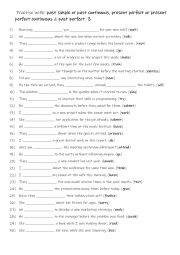
|
A2+-B1 Practise with past simple or past continuous, present perfect or present perfect continuous & past perfect 3
Students should practise past simple, past continuous, present perfect, present perfect continuous, and past perfect to communicate more precisely about different timeframes, actions, and experiences. These tenses help in narrating events, linking the past with the present, and describing ongoing actions. They improve fluency, enable clearer conver...
Level: elementary
Age: 10-100
Type:
Downloads: 110
|
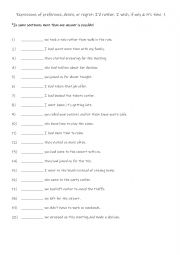
|
Expressions of preference, desire, or regret I�d rather, I wish, if only & it�s time 1
Students should learn expressions of preference, desire, or regret like "I�d rather," "I wish," "If only," and "It�s time" because they help them communicate personal feelings, make choices, and reflect on past experiences or future possibilities in English. These phrases allow students to express what they want, what they regret, or what they feel...
Level: intermediate
Age: 10-100
Type:
Downloads: 105
|
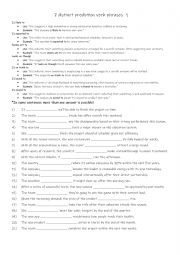
|
7 distinct prediction verb phrases 1
These phrases help express different levels of certainty about future events. "Is likely to" suggests something will probably happen based on evidence, while "is expected to" refers to something predicted or planned. "Seems set to" indicates something is prepared to happen soon, and "looks as though" is used when something seems probable based on c...
Level: intermediate
Age: 12-100
Type:
Downloads: 114
|
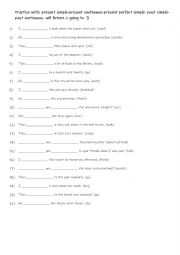
|
A2+-B1 Practise with present simple-present continuous-present perfect simple- past simple-past continuous- will future & going to 3
These tenses help students describe routines, ongoing events, past experiences, and future plans clearly and accurately. Mastery of these tenses improves communication, making it easier to talk about the present, past, and future in both every day and professional contexts. First, students need to familiarise themselves with the tenses and use. The...
Level: elementary
Age: 8-100
Type:
Downloads: 119
|
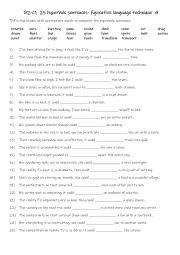
|
B2-C1 25 hyperbole sentences- figurative language technique 4
Recognising and using hyperbole sharpens analytical thinking, as students learn to interpret exaggerated expressions in context. Overall, mastering this figurative language technique makes both written and spoken communication more compelling and expressive. First, students need to familiarise themselves with the 25 words and their meaning. Then th...
Level: advanced
Age: 14-100
Type:
Downloads: 110
|
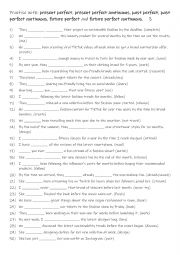
|
B1+-C1 Practise with present perfect, present perfect continuous, past perfect, past perfect continuous, future perfect and future perfect continuous. 3
First, students need to familiarise themselves with the 6 tenses and their meanings. Then they read the sentences to see which one is needed to complete the sentence using the given infinitive in (). Each tense is used 5 times! Answers on page 2
Level: intermediate
Age: 12-100
Type:
Downloads: 101
|
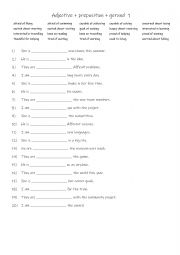
|
Adjective + preposition + gerund 1
Learning adjective + preposition + gerund is essential for natural and fluent English. These structures are common in everyday speech, writing, and exams. They help express ideas accurately, but since prepositions don�t always follow logical rules, mastering them prevents common mistakes and improves overall communication.
Level: intermediate
Age: 10-100
Type:
Downloads: 113
|
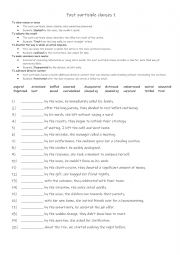
|
Past participle clauses 1
Students complete the gap-fill with the correct word. Answers on page 2.
Level: intermediate
Age: 10-100
Type:
Downloads: 117
|
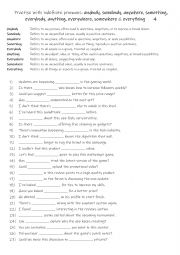
|
A2-B1 Practise with indefinite pronouns anybody, somebody, anywhere, something, everybody, anything, everywhere, somewhere & everything 4
First, students need to familiarise themselves with the 9 indefinite pronouns and their meanings and use. Then they read the sentences to work out which one is needed to complete the gap-fill. Each word is used 3 times! Answers on page 2
Level: elementary
Age: 8-100
Type:
Downloads: 111
|
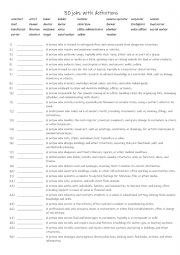
|
A1+-A2 30 jobs with definitions
Students write the name of the job being described. Answers on page 2.
Level: elementary
Age: 8-100
Type:
Downloads: 113
|
|
|
|
|












